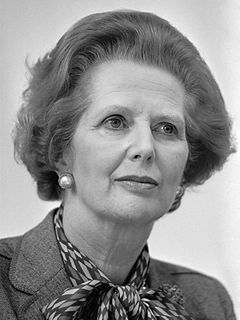Related Research Articles

Thatcherism is a form of British conservative ideology named after Conservative Party leader Margaret Thatcher. The term has been used to describe the principles of the British government under Thatcher from the 1979 general election to her resignation in 1990, and continuing into the Conservative governments under John Major and David Cameron. Proponents of Thatcherism are referred to as Thatcherites.

Chantal Mouffe is a Belgian political theorist, formerly teaching at University of Westminster.

Realism is one of the dominant schools of thought in international relations theory, theoretically formalising the Realpolitik statesmanship of early modern Europe. Although a highly diverse body of thought, it is unified by the belief that world politics is always and necessarily a field of conflict among actors pursuing power. The theories of realism are contrasted by the cooperative ideals of liberalism.

Keith Martin Dowding is Professor of Political Science in Research School of Social Sciences at the Australian National University, Canberra, Australia arriving from the London School of Economics, UK in 2007. He has published widely in the fields of public choice, public administration, public policy, British politics, comparative politics, urban political economy, positive political theory and normative political philosophy. His work is informed by social and rational choice theories. He edited the Journal of Theoretical Politics (Sage) from 1996 to 2012.
James Graham Bulpitt was a professor of Politics at the University of Warwick and a political scientist.

Academics, Members of Parliament, the general public and journalists alike have attempted to rank Prime Ministers of the United Kingdom and Prime Ministers of Great Britain. Those included below generally consist of only a subset of prime ministers, typically those of the 20th century or those who served after the Second World War.

The premiership of Margaret Thatcher began on 4 May 1979, when Thatcher accepted an invitation to form a new administration, and ended on 28 November 1990. She was elected to the position in 1979, having led the Conservative Party since 1975, and won landslide re-elections in 1983 and 1987. She gained intense media attention as Britain's first female prime minister. Her premiership ended when she withdrew from the 1990 Conservative leadership election.
Genopolitics is the study of the genetic basis of political behavior and attitudes. It combines behavior genetics, psychology, and political science and it is closely related to the emerging fields of neuropolitics and political physiology.
A valence issue is an issue where there is a broad amount of consensus among voters. As valence issues are representative of a goal or quality, voters use valence issues to evaluate a political party’s effectiveness in producing this particular goal or quality.
Technology scouting is an element of technology management in which

Roderick Arthur William Rhodes, usually cited as R. A. W. Rhodes, is a British professor of political science.

Alan Finlayson is a British political theorist and political scientist. He is Professor of Political and Social Theory at The University of East Anglia in the United Kingdom, having previously taught in the Department of Political and Cultural Studies at Swansea University, and the Department of Politics and International Relations at Queen's University Belfast. He is a leading advocate of rhetorical political analysis and of its importance for the study of British politics.
Raia Prokhovnik, is Reader in Politics at the Open University's Faculty of Social Sciences, for their Department of Politics and International Studies, and founding editor of the journal Contemporary Political Theory. She is the chair of the OU's interdisciplinary politics module, Living political ideas, and contributed to other modules including Power, dissent, equality: understanding contemporary politics.
Michael Saward, is an Australian and British professor of politics and international studies at the University of Warwick, He was formerly Reader in Politics at Royal Holloway, University of London, and Professor and Head of Department in politics and international studies at the Open University.
Ngai-Ling Sum is a British sociologist and political economist and co-director of the Cultural Political Economy Research Centre at Lancaster University.
In economic theory, the field of contract theory can be subdivided in the theory of complete contracts and the theory of incomplete contracts.

Helen Zerlina Margetts, is Professor of Internet and Society at the Oxford Internet Institute (OII), University of Oxford and from 2011 to 2018 was Director of the OII. She is currently Director of the Public Policy Programme at The Alan Turing Institute. She is a political scientist specialising in digital era governance and politics, and has published over a hundred books, journal articles and research reports in this field.
The Anarchists is a 1964 history book about the history of anarchism by James Joll.
This bibliography includes major books and articles about British prime minister Margaret Thatcher and her policies in office.

Elections to the European Parliament saw declining voter turnout between 1979 and 2014. However, voter turnout in 2019 European elections increased by 8 points compared to 2014. In spite of this exception for all Member States, the electoral mobilization remains weak compared to the national parliamentary elections. Moreover, turnout significantly differs from one country to another in Europe and across a time: in 2019 Belgium citizens participated the most with 88.47% and Slovakians the less with 22.74 %. The potential factors that might influence these trends and their implications have attracted great scholarly attention. Identifying and analysing the factors that determine the relative low turnout at European elections is therefore critical as of one element that weakens the democratic legitimacy of the European Parliament.
References
- ↑ Bulpitt, Jim (1986). "The Discipline of the New Democracy: Mrs Thatcher's Domestic Statecraft". Political Studies. 34 (1): 19–39. doi:10.1111/j.1467-9248.1986.tb01870.x. ISSN 1467-9248.
- ↑ Buller, Jim; James, Toby S. (2011-09-01). "Statecraft and the Assessment of National Political Leaders: The Case of New Labour and Tony Blair:". The British Journal of Politics and International Relations. doi:10.1111/j.1467-856x.2011.00471.x. ISSN 1467-856X.
- ↑ Griffiths, Simon (2016-07-01). "Statecraft as a Straightjacket: A Reply to Gamble and Hayton". Parliamentary Affairs. 69 (3): 735–743. doi: 10.1093/pa/gsv050 . ISSN 0031-2290.